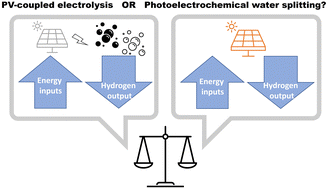Energy Environ. Sci., 2024, 17,1677-1694
DOI: 10.1039/D3EE02814C, Analysis
DOI: 10.1039/D3EE02814C, Analysis
 Open Access
Open Access This article is licensed under a Creative Commons Attribution 3.0 Unported Licence.
This article is licensed under a Creative Commons Attribution 3.0 Unported Licence.Brian Tam, Oytun Babacan, Andreas Kafizas, Jenny Nelson
Photovoltaic-coupled electrolysis and photoelectrochemical water splitting are two options for storing solar energy as hydrogen. For each technology, the energy inputs and hydrogen output need to be considered to compare the overall energy balance.
The content of this RSS Feed (c) The Royal Society of Chemistry
Photovoltaic-coupled electrolysis and photoelectrochemical water splitting are two options for storing solar energy as hydrogen. For each technology, the energy inputs and hydrogen output need to be considered to compare the overall energy balance.
The content of this RSS Feed (c) The Royal Society of Chemistry

